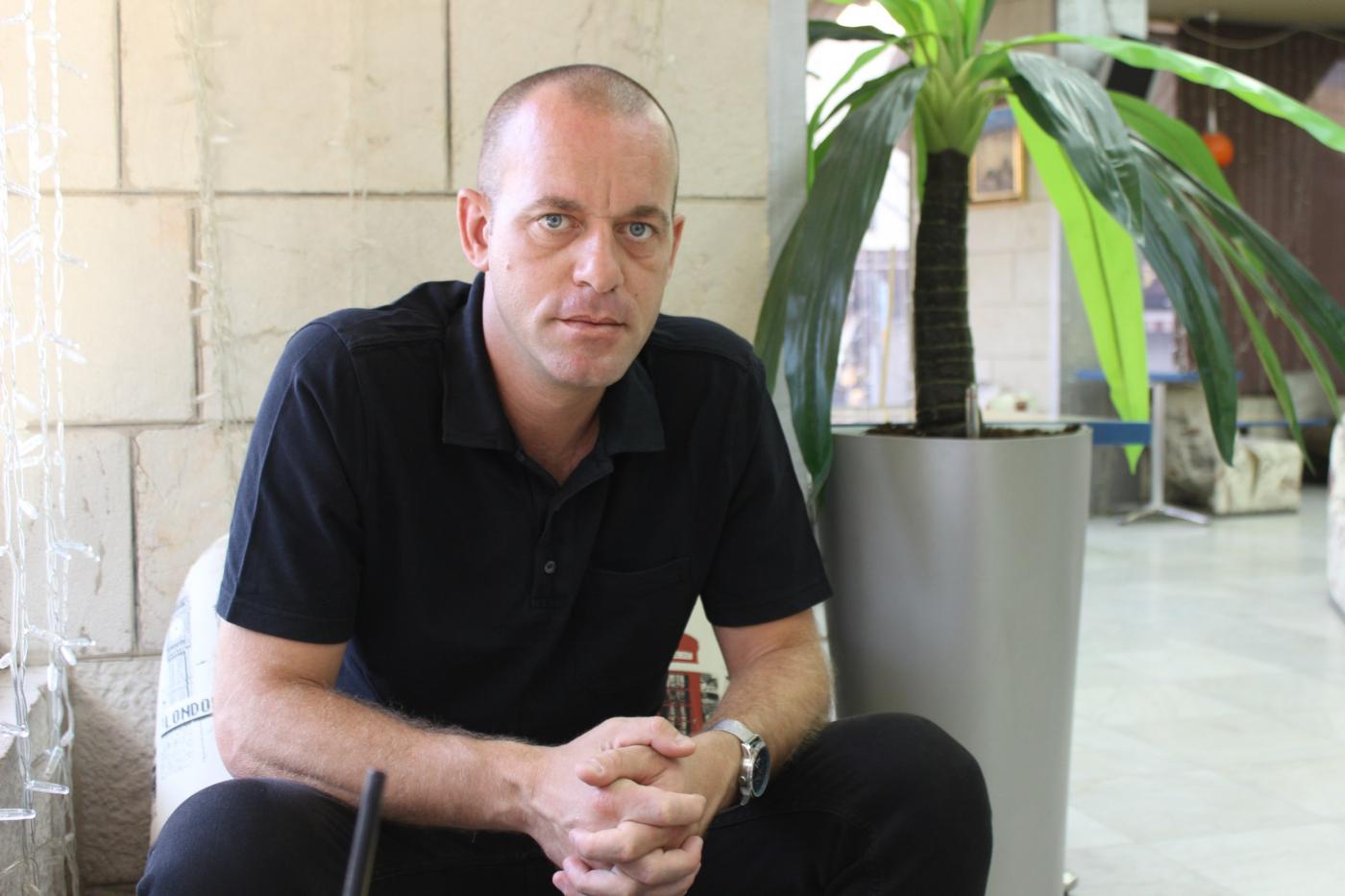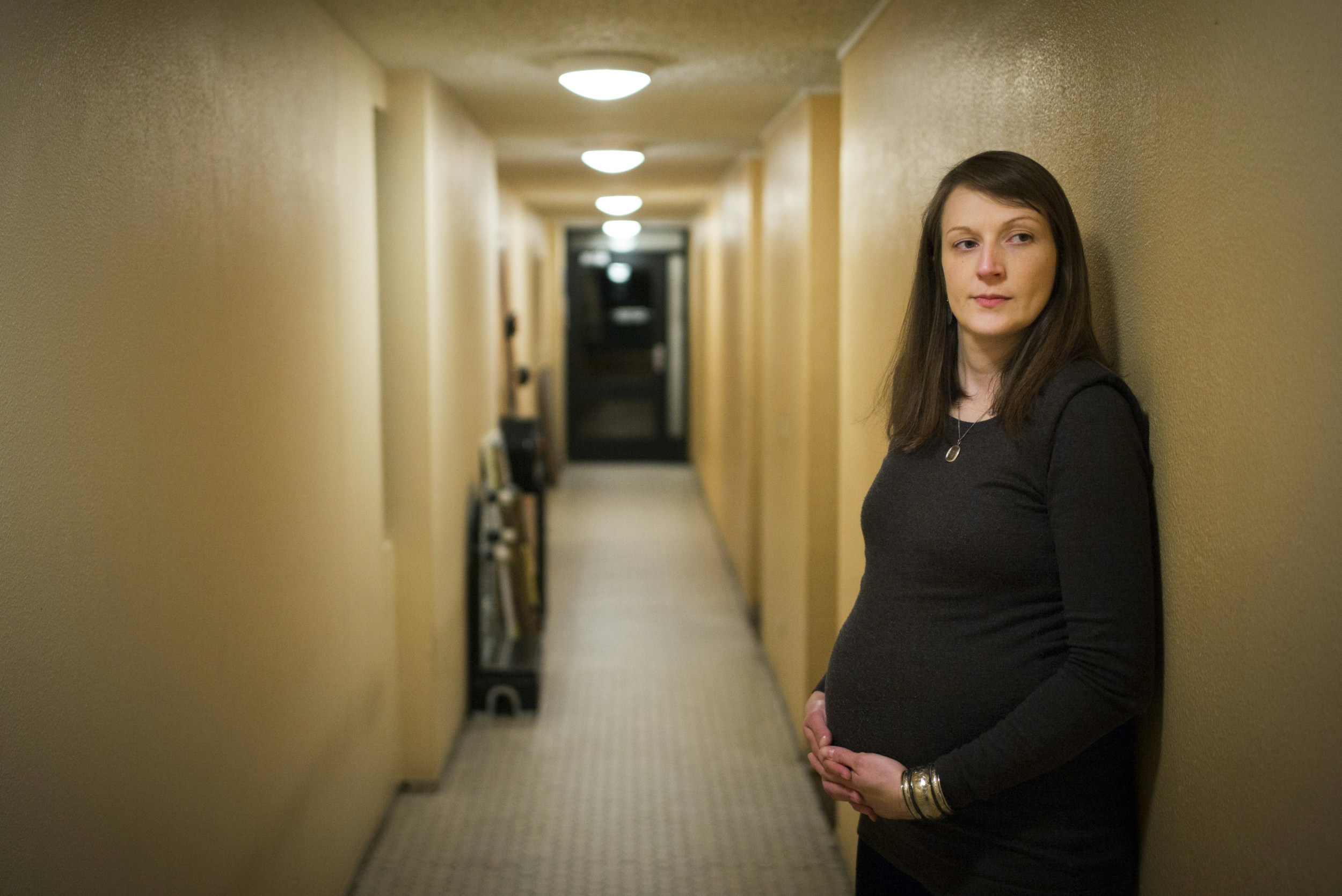Franco-Palestinian lawyer latest target of Israel’s Jerusalem residency revocation policy

Salah Hamouri remains committed to staying in the city of his birth despite continuous Israeli pressure
Over the past 20 years, Salah Hamouri has been shot, arrested, imprisoned and seen his family forced out of the country. Last week, the Palestinian lawyer faced yet another hurdle in his fight to remain in his hometown.
On 3 September, the Palestinian lawyer was summoned by Israeli intelligence services and handed a decision from Israeli Minister of Interior Aryeh Deri stipulating that his status as a permanent resident of Jerusalem was being revoked.
Citing Article 11 of the Citizenship and Entry into Israel Law, the decision was justified on grounds that Hamouri had “breached allegiance to the state of Israel”.
“I now have 30 days to object to the sentence,” Hamouri told Middle East Eye. “Although I am sure the Israeli minister of interior will refuse my appeal, I have the option of going to Israeli courts, which I will do.
“This may take years but I will not waiver my right to live in Jerusalem.”
Hamouri is the latest victim of Israel’s punitive policy of residency revocation, which has long been the bane of Palestinian Jerusalemites.
Neither citizens of Israel nor residents of the occupied West Bank technically under Palestinian Authority jurisdiction, Palestinians in occupied East Jerusalem have long lived in their own separate jurisdictional category.
Granted so-called “permanent residency” by Israel to live in their city, but at the mercy of losing it, Jerusalemites have long complained of being treated as immigrants whose presence in the city is a concession made by Israel that can be overturned at any time.
Lifelong harassment
Hamouri was born in Jerusalem in 1985 to a Palestinian father and a French mother. Raised in the holy city, he told MEE that he lived a normal life until the year 2000.
In the early months of the Second Intifada, the teenager was shot in the thigh with a live bullet during confrontations between Israeli forces and Palestinian protesters in the neighbourhood of al-Ram north of Jerusalem. That bullet is still lodged in his body until today - and from then on, he says he became more aware and involved in the political situation surrounding him.
Hamouri recalls being harassed by Israeli forces and arrested in 2001 when he was 16 years old, only to spend five months in Israeli jails. His crime: spraying slogans on walls and participating in student activities in East Jerusalem.
In 2004, when he was a student in Bethlehem University, he was arrested again and sentenced to five months in administrative detention - imprisonment without trial or charges. The following year, he was charged with belonging to the Popular Front for the Liberation of Palestine (PFLP) and allegedly planning to kill Rabbi Ovadia Yosef, the spiritual godfather of the ultra-Orthodox Shas Movement of which Deri, the minister behind the move to revoke Hamouri’s residency, is now the leader.
While Hamouri rejected the accusations of plotting Yosef’s murder, he says he refused an offer to be deported to France for 15 years. Instead, he was sentenced to seven years in prison - only to be released in 2011 as part of the Gilad Shalit prisoner swap deal.
Upon his release, he decided to study law at Al-Quds University in the West Bank joint city of Ramallah-al-Bireh. On several occasions, Israeli authorities banned him from entering the West Bank, affecting his ability to pursue his education. He eventually succeeded in graduating, and has since worked as a field researcher for Palestinian prisoners rights organisation Addameer.
In 2014, Hamouri married Elsa Lefort, a French woman who had been actively involved in the campaign for his release from prison. But what should have been the beginning of joyful moments in building a family only became new means for Israeli to exert pressure on the Jerusalemite.
In January 2016, Lefort, then six months pregnant, was detained at Ben Gurion airport for three days while returning from a family visit to France. Despite having been granted a one-year visa through her work at the French consulate in October 2015, Lefort was barred from entering Israel - and, by extension, the occupied Palestinian territories - for 10 years.
 Salah Hamouri's wife, Elsa Lefort, pictured here on 20 January 2016, was barred entry by Israel that year while six months pregnant (AFP)
Salah Hamouri's wife, Elsa Lefort, pictured here on 20 January 2016, was barred entry by Israel that year while six months pregnant (AFP)
The decision not only prevented Lefort from giving birth in Jerusalem, depriving their son Watan from obtaining his own Jerusalem residency, but was seen by the family as one more tool to pressure Hamouri into leaving Jerusalem.
“The goal behind my continuous harassment in the past 20 years is to destroy my family life,” he told MEE. “It is not easy to describe the hardship I am suffering with my wife and child, who keeps asking about me and gets emotional every time I leave France to return to Jerusalem."
Hamouri was rearrested in 2017, his administrative detention renewed three times until he was finally released in 2018 - once again without any charges filed against him. He has repeatedly been summoned for interrogation by Israeli intelligence services since.
In the decision to revoke his residency, the Israeli ministry of interior accused Hamouri of still belonging to the PFLP, claimed that he was in contact with others planning an operation against an Israeli figure and that he is still continuing to commit aggressive actions against Israel.
In the wake of two decades of harassment by Israeli authorities, Hamouri says the latest move against him did not come as a shock.
“I didn’t expect to receive this sentence, in which Israel holds me accountable for actions that I was previously convicted and imprisoned for, but at the same time I am not surprised,” Hamouri told MEE.
The French government has reacted to the news, saying it had “taken steps to obtain prompt explanations on the reasons for this decision and the revocation of the permit”.
“Mr Hamouri must be able to lead a normal life in Jerusalem, where he was born and where he resides. His wife and son must also be granted the right to visit him in Jerusalem,” the Ministry of Foreign Affairs said in a press briefing on Friday.
A number of legal associations are standing up to represent Hamouri - but the lawyer has called for broader support by activists and other groups to pressure Israel into backing down.
Jerusalemites under perpetual threat
While Hamouri’s status as a relatively well-known Palestinian with French citizenship has drawn increased attention to his case, the issue of residency revocation is unfortunately very familiar for Palestinians in Jerusalem.
Since first occupying East Jerusalem in 1967, Israel has passed policies seeking to forcibly erase Palestinians ties to the city to establish a Jewish-centric narrative of the city - a process known as Judaisation.
Along with expropriation of lands and homes, restrictions on family reunification, constant bureaucratic hurdles and overpolicing of Palestinian-majority neighbourhoods, the revocation of residency is yet another policy aiming to obtain a Jewish-Israeli demographic majority, pushing Palestinians out of East Jerusalem by making life in the city next to impossible.
The forced transfer of Palestinians from occupied East Jerusalem is a war crime under Article 8 of the statute of the International Criminal Court, notes Munir Nuseibah, the head of the Community Action Centre at Al-Quds University. “Israeli Minister of Interior Aryeh Deri must be punished for committing this criminal offence,” he said.
According to Nuseibah, more than 14,500 Jerusalemites have lost their residency rights in Jerusalem since 1967.
While residency is often revoked for Palestinians unable to give sufficient proof that Jerusalem is their “centre of life”, in 2016, the Ministry of Interior revoked the residency status of a Palestinian woman and her children after one of her sons was killed while attacking Israeli forces - a move which was seen as an alarming escalation of collective punishment measures.
Nuseibah estimates that at least 15 Palestinian Jerusalemites have been stripped of their residency since 2006 over claims of “breach of allegiance to the state of Israel” - a country of which they are not citizens.
That year, three elected member of the Palestinian Legislative Council, along with the former PA minister of Jerusalem affairs, were forcibly transferred to the West Bank.
In 2018, Israel’s parliament, the Knesset, enshrined the punishment against the Palestinian officials into law, granting the Ministry of Interior the ability to revoke residency to Palestinians and Syrians in East Jerusalem and the occupied Golan Heights accused of engaging in anti-Israel activities. This legislation is what has been levied against Hamouri.
Nuseibah notes that the expectation that Palestinians be loyal to the occupying power is a breach of international humanitarian law - including the Fourth Geneva Convention and the Hague Regulations of 1907, whose Article 45 states that “it is forbidden to compel the inhabitants of occupied territory to swear allegiance to the hostile power”.
Nuseibah highlights that such punishment paves the way for the forcible expulsion of thousands of Palestinians from Jerusalem.
“The revocation of residency is a penalty within the framework of the demographic war in Jerusalem,” he says.
“Israel developed a malicious tool enabling the occupation to revoke residency status based on alleged breach of allegiance, in order to reduce the numbers of political activists among Palestinians residents of East Jerusalem.”
Despite Israel seemingly using all weapons in its arsenal to kick Hamouri and countless other Palestinians out of Jerusalem, the Franco-Palestinian remains defiant and determined to fight back.
“This city deserves all kinds of suffering and I will strive to live in it forever,” he says.
Source: Middle East Eye

WRITE YOUR COMMENT